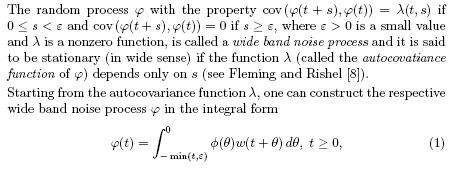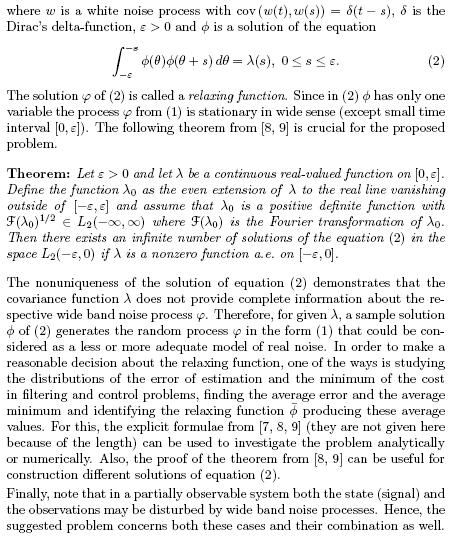Problem 2.1
On error of estimation and minimum of
cost for wide band noise driven systems
Agamirza E. Bashirov
Department of Mathematics
Eastern Mediterranean University
Mersin 10
Turkey
1 DESCRIPTION OF THE PROBLEM
The suggested open problem concerns the error of estimation and the minimum of the cost in the filtering and optimal control problems for a partially observable linear system corrupted by wide band noise processes.
Recent results allow to construct a wide band noise process in a certain integral form on the basis of its autocovariance function and design the optimal filter and the optimal control for a partially observable linear system corrupted by such wide band noise processes. Moreover, explicit formulae for the error of estimation and for the minimum of the cost have been obtained.
But, the information about wide band noise contained in its autocovariance function is incomplete. Hence, every autocovariance function generates infinitely many wide band noise processes represented in the integral form.
Consequently, the error of estimation and the minimum of the cost mentioned above are for a sample wide band noise process corresponding to the given autocovariance function.
The following problem arises: given an autocovariance function, what are the least upper and greatest lower bounds of the respective error of estimation and the respective minimum of the cost? What are the distributions of the error of estimation and the minimum of the cost? What are the parameters of the wide band noise process producing the average error and the average minimum of the cost?
68 PROBLEM 2 MOTIVATION AND HISTORY OF THE PROBLEM
Modern stochastic optimal control and filtering theories use white noise driven systems. Results such as the separation principle and the Kalman-Bucy filtering are based on the white noise model. In fact, white noise, being a mathematical idealization, gives only an approximate description of real noise. In some fields the parameters of real noise are near to the parameters of white noise and, so, the mathematical methods of control and filtering for white noise driven systems can be satisfactorily applied to them. But in many fields white noise is a crude approximation to real noise. Consequently, the theoretical optimal controls and the theoretical optimal filters for white noise driven systems become not optimal and, indeed, might be quite far from being optimal. It becomes important to develop the control and estimation theories for the systems driven by noise models that describe real noise more adequately. Such a noise model is the wide band noise model.
The importance of wide band noise processes was mentioned by Fleming and Rishel [1]. An approach to wide band noise based on approximations by white noise was used in Kushner [2]. Another approach to wide band noise based on representation in a certain integral form was suggested in [3] and its applications to space engineering and gravimetry was discussed in [4, 5]. Filtering, smoothing, and prediction results for wide band noise driven linear systems are obtained in [3, 6]. The proofs in [3, 6] are given through the duality principle and, technically, they are routine, making further developments in the theory difficult. A more handle technique based on the reduction of a wide band noise driven system to a white noise driven system was developed in [7, 8, 9]. This technique allows to find the explicit formulae for the optimal filter and for the optimal control, as well as for the error of estimation and for the minimum of the cost in the filtering and optimal control problems for a wide band noise driven linear system. In particular the open problem described here was originally formulated in [9]. A complete discussion of the subject can be found in the recent book [10].
3 AVAILABLE RESULTS AND DISCUSSION


BIBLIOGRAPHY
[1] W. H. Fleming and R. W. Rishel, Deterministic and Stochastic Optimal Control, New York, Springer Verlag, 1975, p. 126.
[2] H. J. Kushner, Weak Convergence Methods and Singularly Perturbed Stochastic Control and Filtering Problems, Boston, Birkhäuser, 1990.
[3] A. E. Bashirov, “On linear filtering under dependent wide band noises”, Stochastics, 23, pp. 413-437, 1988.
[4] A. E. Bashirov, L. V. Eppelbaum and L. R. Mishne, “Improving ![]() Eotvos corrections by wide band noise Kalman filtering, ” Geophys. J. Int., 108, pp. 193-127, 1992.
Eotvos corrections by wide band noise Kalman filtering, ” Geophys. J. Int., 108, pp. 193-127, 1992.
[5] A. E. Bashirov, “Control and filtering for wide band noise driven linear systems”, Journal on Guidance, Control and Dynamics, 16, pp. 983-985, 1993.
[6] A. E. Bashirov, H. Etikan and N. Semi, “Filtering, smoothing and prediction of wide band noise driven systems”, J. Franklin Inst., Eng. Appl. Math., 334B, pp. 667-683, 1997.
[7] A. E. Bashirov, “On linear systems disturbed by wide band noise”, Proceedings of the 14th International Conference on Mathematical Theory of Networks and Systems, Perpignan, France, June 19-23, 7 p., 2000.
[8] A. E. Bashirov, “Control and filtering of linear systems driven by wide band noise, ” 1st IFAC Symposium on Systems Structure and Control, Prague, Czech Republic, August 29-31, 6 p., 2001.
[9] A. E. Bashirov and S. Ugu![]() ral, “Analyzing wide band noise with application to control and filtering”, IEEE Trans. Automatic Control, 47, pp. 323-327, 2002.
ral, “Analyzing wide band noise with application to control and filtering”, IEEE Trans. Automatic Control, 47, pp. 323-327, 2002.
[10] A. E. Bashirov, Partially Observable Linear Systems Under Dependent Noises, Basel, Birkh![]() auser, 2003.
auser, 2003.
